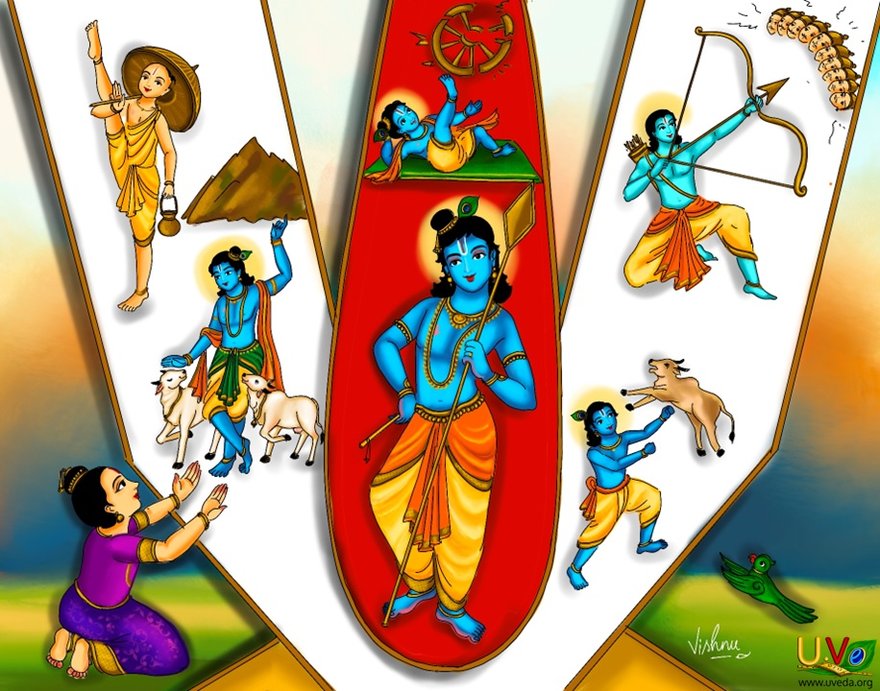TP 1.24
We Have Come Praising Your Valor! Have Mercy.
உன் சேவகம் போற்றி வந்தோம்! இரங்கு

497 அன்றிவ்வுலகமளந்தாய்! அடிபோற்றி *
சென்றங்குத்தென்லிங்கைசெற்றாய்! திறல்போற்றி *
பொன்றச்சகடமுதைத்தாய்! புகழ்போற்றி *
கன்றுகுணிலாஎறிந்தாய்! கழல்போற்றி *
குன்றுகுடையாவெடுத்தாய்! குணம்போற்றி *
வென்றுபகைகெடுக்கும் நின்கையில்வேல்போற்றி *
என்றென்றுன்சேவகமே ஏத்திப்பறைகொள்வான் *
இன்றுயாம்வந்தோம் இரங்கேலோரெம்பாவாய். (2)
சென்றங்குத்தென்லிங்கைசெற்றாய்! திறல்போற்றி *
பொன்றச்சகடமுதைத்தாய்! புகழ்போற்றி *
கன்றுகுணிலாஎறிந்தாய்! கழல்போற்றி *
குன்றுகுடையாவெடுத்தாய்! குணம்போற்றி *
வென்றுபகைகெடுக்கும் நின்கையில்வேல்போற்றி *
என்றென்றுன்சேவகமே ஏத்திப்பறைகொள்வான் *
இன்றுயாம்வந்தோம் இரங்கேலோரெம்பாவாய். (2)
TP.1.24
497 ## aṉṟu iv ulakam al̤antāy ! * aṭi poṟṟi *
cĕṉṟu aṅkut tĕṉṉilaṅkai cĕṟṟāy tiṟal poṟṟi *
pŏṉṟac cakaṭam utaittāy ! pukaḻ poṟṟi *
kaṉṟu kuṇilā ĕṟintāy ! kaḻal poṟṟi **
kuṉṟu kuṭaiyā ĕṭuttāy ! * kuṇam poṟṟi *
vĕṉṟu pakai kĕṭukkum niṉkaiyil vel poṟṟi *
ĕṉṟu ĕṉṟu uṉ cevakame ettip paṟai kŏl̤vāṉ *
iṉṟu yām vantom iraṅku-elor ĕmpāvāy (24)
cĕṉṟu aṅkut tĕṉṉilaṅkai cĕṟṟāy tiṟal poṟṟi *
pŏṉṟac cakaṭam utaittāy ! pukaḻ poṟṟi *
kaṉṟu kuṇilā ĕṟintāy ! kaḻal poṟṟi **
kuṉṟu kuṭaiyā ĕṭuttāy ! * kuṇam poṟṟi *
vĕṉṟu pakai kĕṭukkum niṉkaiyil vel poṟṟi *
ĕṉṟu ĕṉṟu uṉ cevakame ettip paṟai kŏl̤vāṉ *
iṉṟu yām vantom iraṅku-elor ĕmpāvāy (24)
Ragam
Biyāgadai / பியாகடை
Thalam
Ādi / ஆதி
Bhavam
Nāyaki (lovelorn lady)
Simple Translation
497. O! ThrvikRaman!“ Once You rose high and measured the world.
We praise your feet.
You went to southern Lankā as Rāma and killed the Rakshasās.
We praise your strength.
You destroyed Sakatāsuran when he came as a cart.
We praise your fame.
When Vathsāsuran came as a calf you threw him
at Kabithāsuran who had taken the form of a wood apple tree
and killed them both. We worship your ankleted feet.
You carried Govardhanā mountain to save the cows.
We praise your compassion.
We praise the spear in Your hands that conquers Your enemies.
We want to serve You always and have come today to receive
the Parai. Give us your grace.
We are going to worship our Pāvai.
Velukkudi Sri. U. Ve. Krishnan Swami’s Upanyasam
TP.1.24
Word by Word (WBW) meaning
(The words may be rearranged to facilitate conversion from poetry to prose (Aṉvayam). Please read the meanings (in black) continuously to form the sentence and understand the simplified meaning based on the Divyārtha Dīpikai for the verse.)
அன்று இவ்வுலகம் — முன்னொரு சமயம் இவ்வுலகங்களை; அளந்தாய்! — அளந்தவனே!; அடிபோற்றி — நின் திருவடிகள் வாழ்க!; சென்று அங்கு — அங்கு சென்று; தென்னிலங்கை — இலங்கையை; செற்றாய்! — அழித்தவனே!; திறல் போற்றி! — உன் பலம் வாழ்க!; பொன்ற சகடம் — சகடாசுரன் அழிந்திட; உதைத்தாய் — உதைத்தாய்!; புகழ் போற்றி! — உன் புகழ் வாழ்க!; கன்று — கன்றுருவில் வந்த அசுரனை; குணிலா — தடி மாதிரி; எறிந்தாய்! — வீசி அழித்தாய்!; கழல் போற்றி! — நின் திருவடி வாழ்க!; குன்று — கோவர்த்தனகிரியை; குடையாய் — குடையாக; எடுத்தாய்! — தூக்கினாய்; குணம் போற்றி! — உன் குணம் வாழ்க!; வென்று பகை — பகைவர்களை ஜெயித்து; கெடுக்கும் — அவர்களை அழிக்கும்; நின்கையில் — உன் கையிலுள்ள; வேல்போற்றி! — வேல் வாழ்க; என்று என்று — என்றிப்படிப் பலவாறாக; உன் சேவகமே — உன்னுடைய வீர்யங்களையே; ஏத்தி — புகழ்ந்து பாடி; பறை கொள்வான் — பறை பெறுவதற்காக; இன்று யாம் வந்தோம் — இன்று நாங்கள் வந்தோம்; இரங்கு — கிருபை செய்வாயாக!; ஏலோர் எம்பாவாய் — பெண்களே பாவை நோன்பு நோற்க வாரீர்!
anṛu — long ago that time (when indhiran and others suffered due to mahābali); al̤andhāi ivvulagam — ŏh you who measured these worlds! (with two steps); adi — (those) divine feet (of yours); pŏṝi — shall live for many years and more years (pallāṇdu pallāṇdu);; angu — in the place where rāvaṇan lived; senṛu — (you) went (எழுந்தருளி); cheṝāi then ilangai — ŏh you who destroyed the lanka of the south! (which is his country); thiṛal — (your) strength; pŏṝi — shall live for many years;; chakatam — chakatāsuran; udhaiththāi chakatam ponṛa — ŏh you, who kicked that chakatam (chakatāsuran) and destroyed!; pugazh — (your) valor; pŏṝi — shall live for a long time;; kanṛu — vathsāsuran who stood as a calf; kuṇilā — was used as a throwing staff (pole),; eṛindhāi — ŏh you who threw (at the asura who took the form of a fruit (vil̤ānkani / விளாங்கனி) (எறிந்தருளியவனே!); kazhal — your thiruvadi (lotus feet which stood ground); pŏṝi — shall live for a long time;; eduththāi — ŏh you who lifted; kunṛu — gŏvardhana mountain; kudaiyā — as an umbrella / shelter!; guṇam — your characteristics (like sauseelyam, etc.,); pŏṝi — should stay for years together;; nin kaiyil vĕl — the spear in your hands; venṛu — that won (the enemies); pagai kedukkum — and destroyed them (the opposition); pŏṝi — should live for a long time;; enṛu enṛu — ṣo doing such mangal̤āsāsanam several times,; ĕththi — to praise / sthŏthram; un sĕvagamĕ — about only your strength/valor,; yām — we; vandhŏm — came and reached; ingu/inṛu — this place / today; paṛai kol̤vān — to get paṛai (instrument (mŏksham)); irangu — please show compassion (to help us).
Detailed Explanation
anṛu ivvulagam aLandhāi adi pŏṝi
– (pallāṇḍu to your feet which measured all the worlds that day (long ago))
anṛu – that day (long ago) – when Indra was suffering after king Mahābali took the worlds from him (though they are truly yours).
inṛu – today – when we are suffering from separation from you; when we have shed our strītvābhimāna (the thought